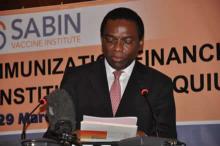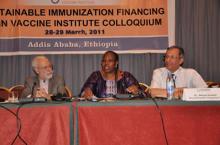Sabin Colloquium on Sustainable Immunization Financing convened
Addis Ababa, Ethiopia, 30 March 2011 -- Vaccines save millions of lives in developing countries; eradicated smallpox; lowered the global incidence of polio by 99 percent since 1988; and have achieved dramatic reduction in morbidity and mortality from a wide range of vaccine preventable diseases.
However, the cost of immunizing a child exceeds the total per capita governments spend on all health care in many developing nations. Sustainable vaccine financing increasingly represents a critical aspect of maintaining a stable vaccination program.
The Sabin Vaccine Institute convened the first ever high-level “Colloquium on Sustainable Immunization Financing” in Addis Ababa, Ethiopia, from March 28-29, 2011. The event brought together over 75 delegates representing ministries of health and finance, and parliaments from 18 African, Asian and Latin American countries.
“We know that effective vaccination programs contribute to healthier, more productive societies” said Dr. Ciro A. de Quadros, Executive Vice President of Sabin Vaccine Institute. “Immunization is one of the best investments a country can make. Our goal in countries we collaborate with is to identify long-term sources of financing and assure a fiscally sustainable national immunization program.”
“External funding for vaccines in the developing world is not guaranteed. Helping countries find ways to increase and sustain their national immunization budgets is critical and a necessary public health priority,” The World Health Organization Regional Director for Africa, Dr. Luis Gomes Sambo, said. He further added, “Although 85% of the countries in the region have specific budget lines for procurement of vaccines, they fail to address the operational costs on national immunization programmes. It is a paradox that while vaccines and technologies are readily available, we are still experiencing limited access to them due to lack of adequate funding”.
Dr Sambo also advised that immunization financing should not be considered in isolation from overall health financing and we should take the opportunity of leveraging immunization services as a way to strengthen health systems.
“Bringing vaccine prices down is a critical element to sustainable vaccine financing. With our market shaping work, including the Advanced Market Commitment, we have facilitated lower vaccine prices, but there is enormous work still to be done,” Mr. Dagfinn Hoybraten, Chairman of the GAVI Alliance Board said.
Possible sustainable funding mechanisms including increased funding from current government revenues, development of decentralized immunization budgets and the creation of national Immunization trust funds should be explored.
“The country plans and concrete next steps agreed in this meeting, once implemented, will be a good ‘compass’ to provide direction and guidance to achieve sustainable financing for immunizations,” Dr. Fatoumata Nafo-Traoré, the WHO Representative to Ethiopia, advised in her closing remarks. She added that in addition to sustainable financing, as very influential citizens, the participants should be more involved in social mobilization to increase demand and uptake of vaccines.

